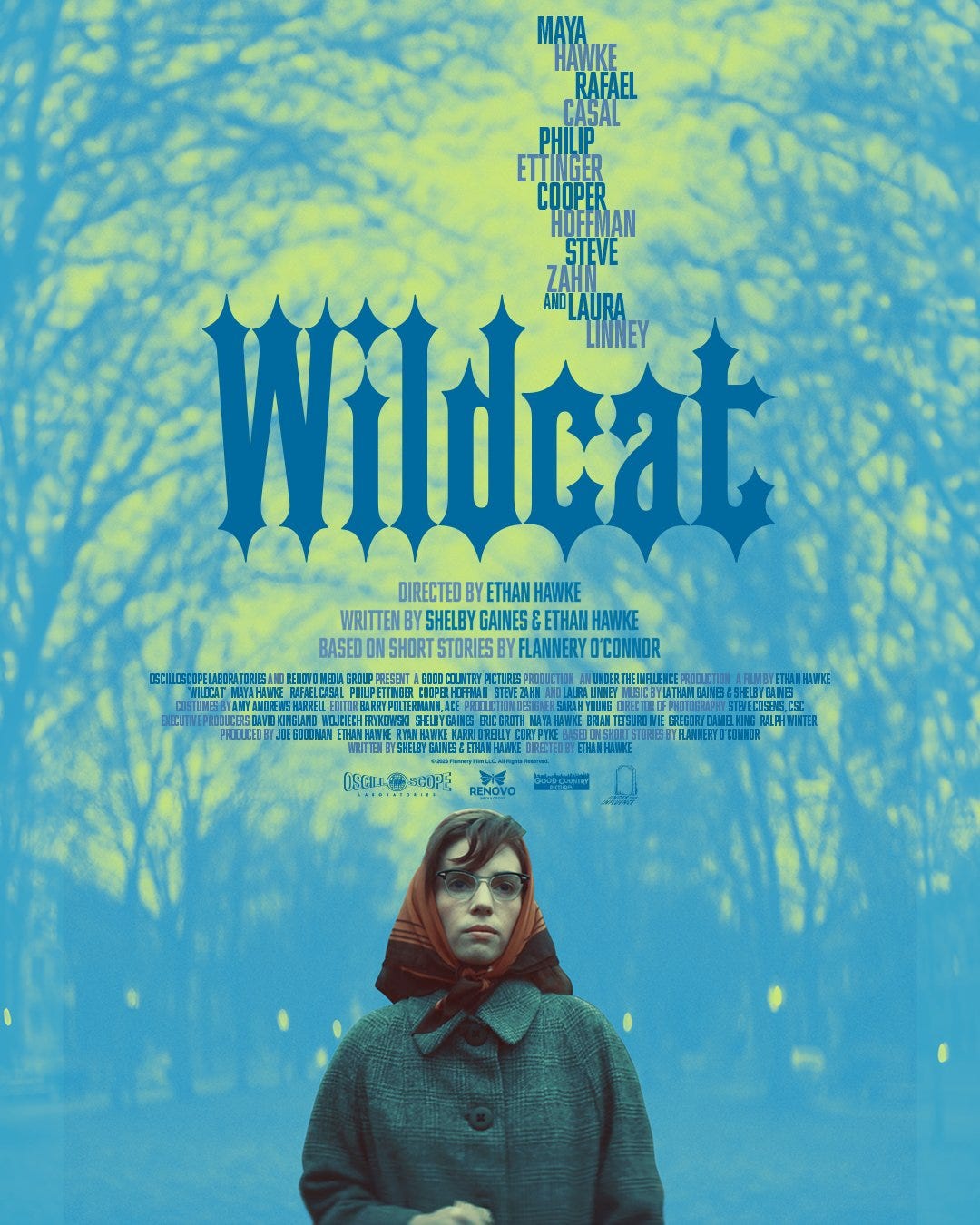Wildcat Movie Review
Highly recommended, Wildcat is an innovative portrayal of Flannery O’Connor’s interior life and an authentic grappling with suffering through the lens of faith.
From the very beginning scene, which portrays one of Flannery O’Connor’s short stories re-imagined as a trailer for a dramatic black and white film, I knew I was in for an artistic treat.
Directed and co-written by Ethan Hawke, Wildcat is a deep delve into the mind of celebrated Catholic Southern Gothic writer Flannery O’Connor (Maya Hawke) as she navigates whether scandalous art can still serve God, and the role of suffering in her life. The movie focuses on the time when Flannery, at twenty-four years old, is diagnosed with lupus, the same disease that ended her father’s life. As a result, she moves in with her mother (Laura Linney), though their relationship has long been strained. She is desperate to make her mark as a great writer, and must face her mortality earlier than most. She dives deeply into her craft, blurring the lines between reality, imagination, and faith. Through her suffering, she ultimately comes to peace with her illness and finds healing with her mother as well.
“Let me be your typewriter.” The echoes of this prayer from the depths of O’Connor’s heart reverberate through the entire film. Her yearning to make her mark on the world, to leave behind words that matter and that stand the test of time is particularly affecting as she, and we, are faced with the fact that she is sick, a truth that will greatly impact the amount of time she has to pursue and accomplish those goals. Subsequently, WIldcat also unflinchingly examines Flannery’s wrestling with suffering and her own personal cross, and how that suffering interacts and intersects with her faith.
Of particular note, O’Connor’s Catholicism is on full display, and is portrayed as an asset to her creative genius and a bulwark through her personal storm. Her famous line about the Eucharist: “If it’s just a symbol, to hell with it,” makes a particularly poignant appearance at a party filled with drinking, smoking and carousing. O’Connor’s faith-laden words and her sobering conviction shine ever clearer in a place where the idea of God has been reduced to a mere floating of drunken self-indulgent and overconfident spoutings-off. As she wrote and speaks in the movie: “They think faith is a big electric blanket, when of course it is the cross.”
In one of the movie’s most memorable scenes, O’Connor’s priest visits her while she is bedridden. There, she wrestles with the depths of her pain regarding the lot she’s been given, and questions if the sometimes-scandalous work she produces can still be pleasing to God. The scene ends with the beginning of a good Confession, a concrete example of the strength and grace that she, and many Catholics, including myself, receive in the sacraments.
Wildcat also doesn’t shy away from the more controversial aspects of O’Connor’s life and works, particularly the blight of racism in Flannery herself and in the world she inhabited. In the film, director Ethan Hawke does not justify these things away, nor does he fight against them. He allows them to exist as part of a portrait of a complicated yet brilliant figure, and gives room for the viewer to draw his or her own conclusions.
This was a quiet and thoughtful film, on the whole, apart from the vignettes that showcase the shocking and brutal nature of O’Connor’s stories, and yet I found myself nearly holding my breath through much of it, not wanting to miss a single word, a single moment.
In the vein of films like Father Stu, Wildcat similarly stands out for its portrayal of a brilliant and very human Catholic person who deeply loved her faith, who found comfort in that faith during her life’s greatest trial, and for whom faith played an inextricable part in the unconventional stories she chose to tell. Wildcat begs to be savored while watching, and is primed to provoke discussion for some time after the final credits have rolled.
Content Considerations: Some violence via depictions of scenes from Flannery O’Connor’s short stories, kissing, partially dressed characters in intimate situations.
-Lorelei






